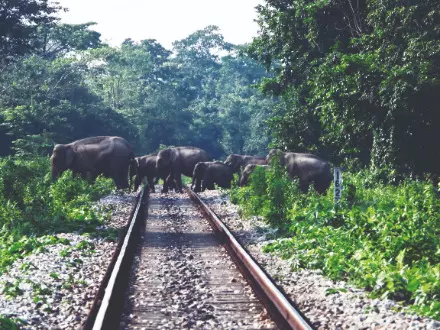
Alipurduar, Oct. 17 -- The latest elephant census in India has brought a rare piece of good news for West Bengal. While nationwide numbers show a decline, North Bengal has recorded a significant increase in its elephant population, particularly in the Eastern Dooars Elephant Reserve.
According to the 2017 census, North Bengal had 488 elephants. The latest survey shows the number has risen to 676, and experts suggest the actual figure could be even higher. They note that without deaths from train collisions and electrocution, the population growth over the past eight years would have been even more pronounced.
Conducted between 2021 and 2025 under the Union Ministry of Environment, Forest and Climate Change, the nationwide census was led by the Wildlife Institute of India (WII) in collaboration with State Forest Departments. For the first time, DNA-based analysis was used, marking a shift from the 2017 "block count method" that involved direct counting of elephants. The new "mark-recapture" approach analyses DNA from elephant dung, allowing for more precise population estimates.
The survey indicates that forested areas across India now house around 22,446 elephants, a drop of nearly 7,500 from the 2017 count of 29,964. In contrast, North Bengal has bucked the trend, with elephants moving freely across Buxa Tiger Reserve, Jaldapara National Park, Gorumara, and plains from Kumargram near Assam to Naxalbari near Nepal.
Animesh Basu, coordinator of The Himalayan Nature and Adventure Foundation (HNAF), noted, "North Bengal's forests are still relatively intact. However, over the past century, forest cover has not increased. A rise in elephant numbers could heighten human-wildlife conflicts, which authorities must address."
Novojit De, ADFO of Buxa Tiger Reserve, highlighted two key priorities: maintaining elephant corridors and increasing fodder plantations over the next five years. Forest officials also warned that this year, Jaldapara's grasslands-vital for elephants-were severely damaged by Bhutanese waters, underscoring the urgency of habitat restoration. Praveen Kaswan, DFO of Jaldapara, stated, "Our responsibility to protect these animals has grown even further."
Chief Conservator of Forests (Wildlife), North Bengal, Bhaskar JV, added, "DNA analysis has provided an almost precise count. The increase is encouraging, but we must also consider potential human-elephant conflicts."
Nationally, 528 elephants have died from unnatural causes over the past five years, including 392 from electrocution and 73 in train accidents, according to data presented in the Lok Sabha in July.
Published by HT Digital Content Services with permission from Millennium Post.
